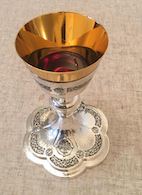The Passion in Seven Objects: 5 - Wine

In the days leading up to Easter we try to enter more deeply into what Jesus is doing as he walks the way to the cross. I offer these brief meditations in that spirit, each day using one of the objects that appears in the gospels.
9th April
WINE - SWEET and BITTER
They came to a place named Golgotha (which means Place of a skull). They offered him wine to drink, mixed with gall. But when he tasted it, he would not drink it (Matthew 27:33-34)
It is a moment of utter dread. Jesus now sees before him the place of his execution. We might expect him to falter. At this very moment he is offered wine mixed with a drug that would stupefy him. This cup was meant kindly, a rare gesture of kindness in the brutal world of Roman punishment. Nothing could remove the pain of crucifixion, but this sedative might take the edge off some of the agony. Jesus, tasting the potion, refuses it.
It is a moment of courage. But it is also a statement of who he is and why he is here. He has come to be among us as one of us in all things but sin. To be human is to be vulnerable. We know physical pain, emotional pain and social pain. All three are now part of the path that he is walking.
Physical pain: be has been whipped and punched, with the worst still to come.
There is emotional pain - we think of him looking at his mother, aware of her suffering too, or of the cry of desolation when he quotes Psalm 22.
There is social pain, the feeling of having been rejected and paraded through the streets as an outcast. Ending up outside the city, expelled from the community, a placard proclaiming his offences for all the world to see.
Jesus the Messiah will not evade any of the suffering which can afflict ordinary men and women. His identification with us is total.
It is a moment of great courage and great love. It shows us the divine longing that pain should stop here. God does not glory in suffering. You could say that God on the cross dramatizes the power of human sin, in order to show God's even greater power to love and to forgive.
If we are deeply moved by the sight of the Saviour on the cross we must also be deeply moved by the suffering of our brothers and sisters. In the parable of the great trial, Jesus tells us that he will be found among hungry, naked, thirsty and imprisoned people (Matthew 25:31-46). The personal and the social always go together in Christian discipleship. We will struggle with our endless self-centredness, but we also try to look on the world around us with the eyes of Christ. His suffering on the cross, unabated by any soothing drug, makes us take more seriously the suffering of the world.
Perhaps the church talks too much about sin, but so much suffering in our world is caused by sin. We are learning more and more how even natural disasters, that seemed in the past to be random events, are often linked to our lifestyles. The cross challenges us to live responsibly. Repentance is personal - we feel sorrow for our failings, no one else can do this for us - but the outcome of our repentance is change, with effects that can ripple out far beyond us.
Turning from sin, repenting, changing the world - this is an ideal, of course. But the point of ideals is to lift our aspirations, enlarge our horizons, inspire our imaginations. This is why there was another cup, this time inaugurated by Jesus, only hours before. At a seder table in an upper room he lifted bread, blessed it and proclaimed it to be his body. He took the cup of wine, blessed it and proclaimed it to be his blood. Ever since then, in every eucharist Christians have found his presence in their midst, and have gone out to seek his presence in the world as they stand alongside others in their hour of need. This cup of sweetness binds us to both the joy of heaven and the sorrow of the earth, reminding us that Christ, the host at the table, shared these with us.
Jesus our Saviour, you know how we distract ourselves
from the distress and hurt of the world,
how we resent our own pain.
Yet you endured pain so that we might be healed,
you drank to the dregs the cup of suffering.
We stretch out our hands to the cup of the eucharist,
asking that this may be to us sweetness and love,
and that it may send us out refreshed
to be that people that you call into being
each new day.


















